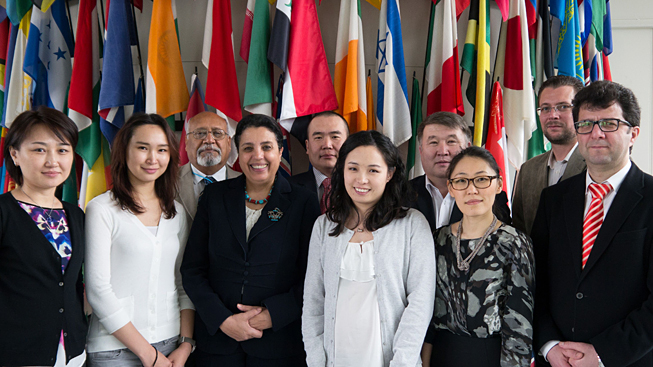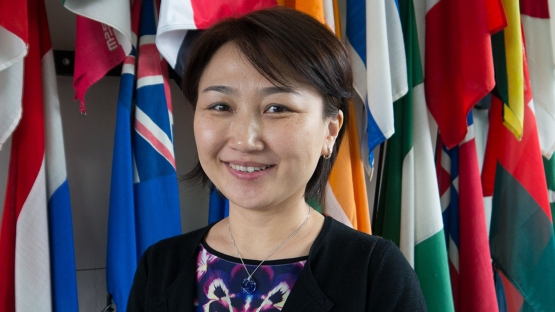Replacements for existing radiotherapy treatment units and the forthcoming installation of two new linear accelerators will greatly boost Mongolia's national cancer programme and reduce waiting times for cancer patients. This was one of the key conclusions reached at a meeting in Vienna in the last week of March between delegations from key counterpart institutions in Mongolia and IAEA staff. The meeting was held to finalize Mongolia's Country Programme Framework (CPF) for 2016–2021 and to review ongoing projects for the period 2016–2017.
A CPF is a strategic document that ensures that the application of nuclear technology is integrated with a Member State's existing development plans. It defines priority development needs and interests that can be supported through the IAEA's technical cooperation activities. Mongolia's new CPF highlights one of the country's highest priorities: human health.
As a Member State of the IAEA since 1973, Mongolia has been closely involved with the Agency for decades, and has received assistance in using nuclear applications to better the lives of its people.
"The concrete steps taken through the IAEA projects to support Mongolia in a number of areas using the peaceful applications of nuclear techniques will help our country and our people, and we value this valuable cooperation we have with the Agency," said Tamir Nyambayar, the country's National Liaison Assistant to the IAEA.
At the March meeting, views were exchanged on future technical cooperation activities to address Mongolia's health needs, including consideration of the status of radiotherapy equipment, said Massoud Malek, who oversees Mongolia's technical cooperation projects in the IAEA Technical Cooperation Department.

Mongolian representatives with IAEA staff at the IAEA headquarters. (Photo: S. Henriques/IAEA)
The last few years have seen an increase in cancer cases in Mongolia, and "being a developing country, we need all the support that the Agency can provide us," said Minjmaa Minjgee, a radiation oncologist with the National Cancer Center in Ulan Bator.
Effective treatment through quick diagnosis
IAEA support has been crucial for Mongolia in the acquisition of a gamma beam radiation protection system and an X-ray calibration system to support the country's cancer control, diagnosis and treatment programme. The IAEA is also assisting Mongolia in upgrading a computed tomography (CT) and single photon emission computed tomography (SPECT) medical imaging system at the First General Hospital. In addition, there are plans to install two linear accelerators (LINACs) in 2015, in a new hospital extension building that will be inaugurated later on this year. The possibility of installing an advanced 3D brachytherapy facility for patients in 2016 is also under consideration.
The presence of such state-of-the-art technology in Ulan Bator will enable Mongolia to treat more cancer patients, and will help to reduce the long waiting times for patients.
In addition, IAEA's resource mobilization assistance to Mongolia resulted in significant funding provided by Japan and Monaco for upgrading the radiotherapy treatment planning system's hardware and software at the National Cancer Center in Ulan Bator.
"Time is of the essence where cancer is concerned; quick diagnosis and effective treatment in a timely manner can help patients, and these radiotherapy machines are what we need to meet this goal of ours," Minjgee reiterated.
Progress achieved
Despite its size, Mongolia is one of the most sparsely populated countries in the world with a population of just around 3 million people, of which 45 per cent live in Ulan Bator, the capital.
"Our objective is to provide access to cancer diagnosis and treatment to people from the countryside so lives can be saved," Minjgee said.
"It is not an easy task. Despite our Government's effort to develop in this field, we highly value international cooperation and support, including with the IAEA, to help us improve the quality of medical care and services in cancer treatment which today is an urgent health problem — cancer is responsible for 22 per cent of the total population mortality. It is the second main cause after cardiovascular diseases," she said.
Since 1995, the IAEA has been helping Mongolia to enhance its national cancer programme, including with projects and technical training. Three major IAEA technical cooperation projects have been successfully implemented: improving radiotherapy services in Mongolia; upgrading quality assurance; and developing new technologies and radiation safety systems for radiotherapy services.
Mongolia has also received assistance through the IAEA Programme of Action for Cancer Therapy (PACT) related to paediatric cancer care, palliative care and training in radiation medicine. Mongolia also received an imPACT mission in 2010, and subsequently developed and endorsed a General Action Plan on Cancer Prevention and Control for 2011–2021 and is a PACT Model Demonstration Site (PMDS).
"We need a sustainable programme and we value the support we have received from the Agency," Minjgee said. For example, Mongolia's 'Strategic Plan for the Development of Radiotherapy' covering the period 2011 to 2021 calls for upgrading the quality of radiotherapy in Mongolia to international standards, and for providing easy access for all patients in need of this treatment.
Planning for the future
During the March meeting, the Mongolian delegation and the IAEA team also worked closely to improve future work plans to address the needs of other sectors using nuclear science and technology, including uranium mining, livestock protection, industry and environmental monitoring. A range of needs were identified and prioritized, keeping in focus the optimal utilization of resources. "The meeting was an excellent demonstration of how we continue to build team work, which will allow us to better deliver our technical cooperation programme," Malek said.
Time is of the essence where cancer is concerned; quick diagnosis and effective treatment in a timely manner can help patients, and these radiotherapy machines are what we need to meet this goal of ours.


